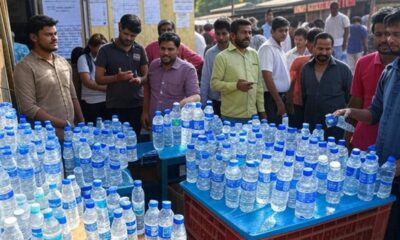Karnataka
Karnataka CID Files Charge Sheet Against B S Yediyurappa in Molestation Case
Karnataka CID files charge sheet against former CM B S Yediyurappa in molestation case involving a minor, following a complaint by the victim’s mother.
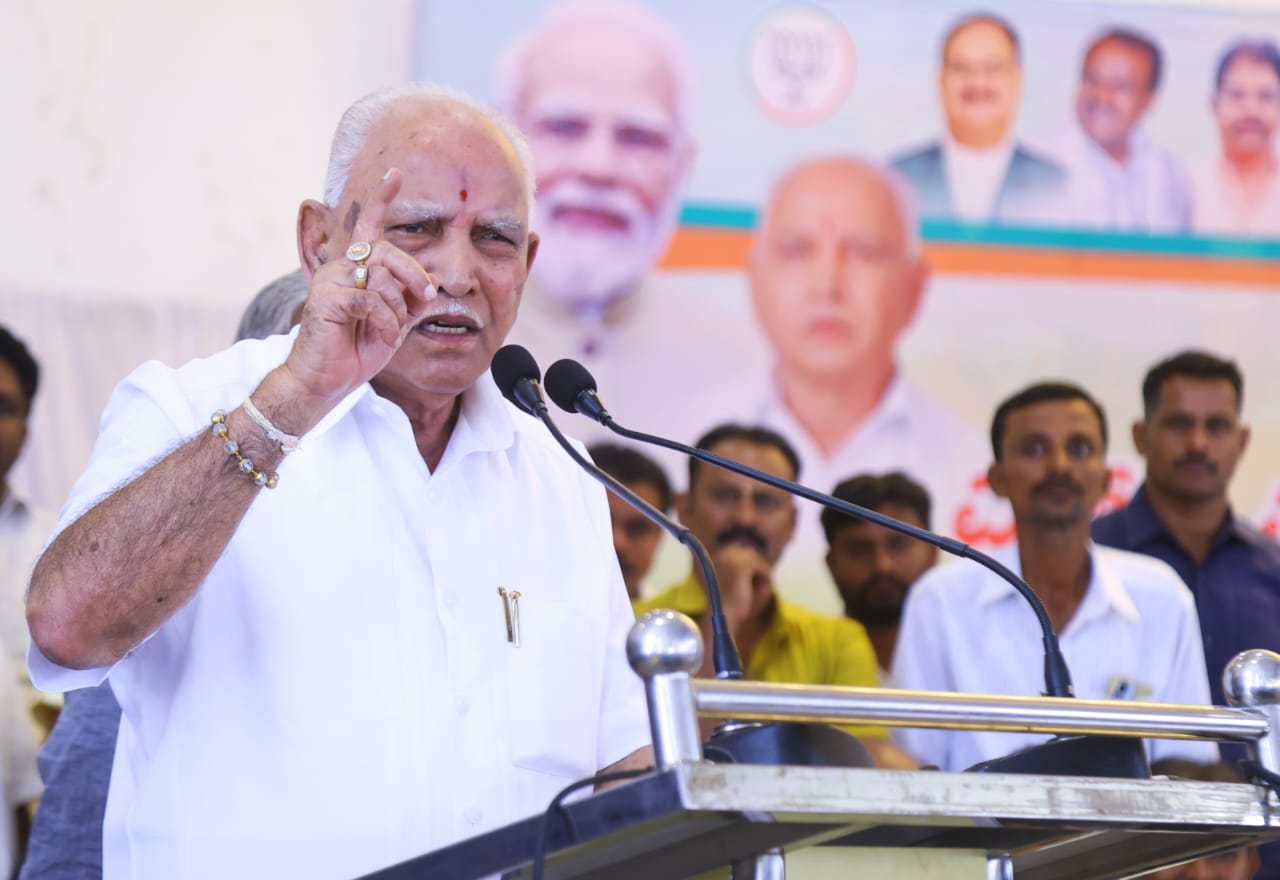
The Crime Investigation Department (CID) probing molestation charges against former Karnataka Chief Minister B S Yediyurappa has taken a significant step forward. On Thursday, the CID filed a charge sheet in the special court dealing with Protection of Children from Sexual Offences (POCSO) cases. This development comes after the Sadashivanagar police registered a case of molestation in March this year against the BJP stalwart. Following the registration of the case, Karnataka Director General of Police Alok Mohan issued an order transferring the investigation to the CID.
The case originated from a complaint lodged by the mother of a 17-year-old girl. She alleged that Yediyurappa molested her daughter during a meeting on February 2nd this year at his residence in Dollars Colony, Bangalore. The allegations have stirred significant controversy, with Yediyurappa vehemently denying the charges. He stated, “People would teach a lesson to those indulging in conspiracies against me,” signaling his intent to fight the accusations.
Tragically, the 54-year-old woman who filed the complaint passed away last month in a private hospital due to lung cancer. Despite her passing, the case has continued to progress under the scrutiny of the CID. On June 17, Yediyurappa was questioned by the CID for approximately three hours in connection with the case. This interrogation marks a critical phase in the investigation as the CID compiles evidence and testimonies to support the charges against the former Chief Minister.
Adding to the complexity of the situation, the Karnataka High Court had previously issued orders restraining the CID from arresting Yediyurappa. This order provides temporary relief to the former Chief Minister, allowing him to remain out of custody while the investigation continues. The high-profile nature of this case, involving a prominent political figure, has attracted significant public and media attention.
B S Yediyurappa
Yediyurappa, a veteran politician with a substantial following, has found himself at the center of this scandal. His denial of the charges and assertion of a conspiracy against him have fueled a narrative of political intrigue and manipulation. Supporters of Yediyurappa view the charges as an attempt to tarnish his reputation and undermine his political standing. On the other hand, detractors argue that the law must take its course, and justice should be served, irrespective of the accused’s political stature.
The CID’s charge sheet filing is a procedural step that indicates the completion of their preliminary investigation. It suggests that the agency believes there is sufficient evidence to proceed with prosecuting Yediyurappa. The special court handling POCSO cases will now review the charge sheet and determine the subsequent legal proceedings. This case is expected to undergo rigorous scrutiny, given the involvement of a high-profile accused and the sensitive nature of the charges.
As the legal battle unfolds, it is likely to impact the political landscape in Karnataka. Yediyurappa’s supporters within the BJP and his broader political base will be closely monitoring the proceedings. The outcome of this case could influence public opinion and potentially alter the dynamics within the party. Conversely, opposition parties may leverage the case to question the BJP’s moral standing and governance.
The allegations against Yediyurappa and the subsequent legal proceedings highlight the broader issue of accountability and transparency in public office. Cases involving accusations of sexual misconduct and abuse of power are critical in shaping public trust in political leaders and institutions. The legal system’s handling of this case will be indicative of its commitment to justice and the rule of law, irrespective of an individual’s social or political standing.
In conclusion, the filing of the charge sheet against B S Yediyurappa by the CID marks a pivotal moment in this high-profile molestation case. The legal proceedings that follow will be closely watched, not only for their judicial outcomes but also for their broader implications on Karnataka’s political landscape. Yediyurappa’s steadfast denial and claims of a conspiracy add layers of complexity to an already intricate case. As the special court examines the charge sheet and moves forward with the trial, the pursuit of justice remains paramount, serving as a reminder of the principles that underpin a fair and democratic society.
Bidar
Heavy Rain Hits Bidar: Thunderstorms Bring Relief and Disruption
On Thursday, April , 2025, Bidar city and several parts of the surrounding taluk experienced a refreshing yet powerful thunderstorm accompanied by heavy rain. According to a recent report by Prajavani, the downpour brought a much-needed break from the heat, cooling down the region and leaving residents with mixed feelings of relief and concern. The […]
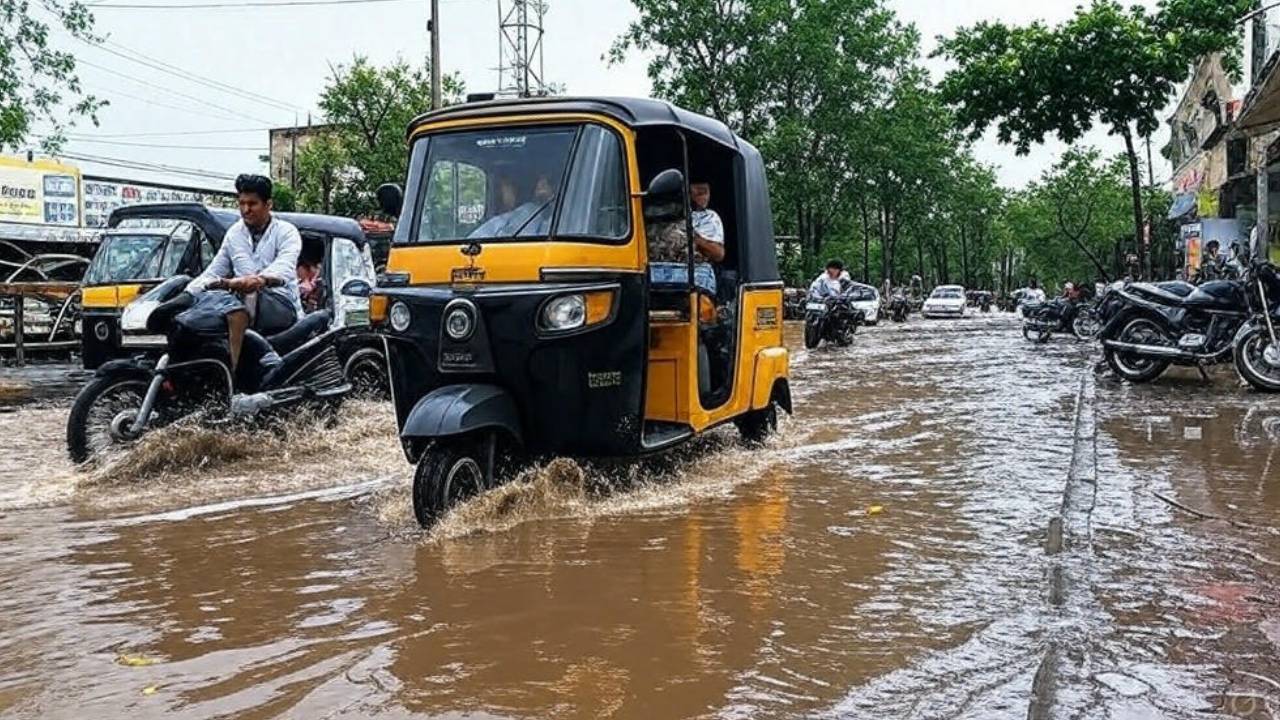
On Thursday, April , 2025, Bidar city and several parts of the surrounding taluk experienced a refreshing yet powerful thunderstorm accompanied by heavy rain. According to a report, the downpour brought a much-needed break from the heat, cooling down the region and leaving residents with mixed feelings of relief and concern.
The rain, paired with rumbling thunder, swept across multiple areas, offering a soothing change in weather. While no injuries or fatalities were reported, the storm did leave its mark. In Chikli (J) village of Aurad taluk, fierce winds knocked down an electric pole, hinting at the intensity of the weather event. Thankfully, the damage was minimal, and life continued with little interruption.
For the people of Bidar, this sudden burst of rain was a welcome surprise after days of warm weather. The stormy skies not only lowered temperatures but also painted a dramatic picture across the region. As the clouds rolled in, they brought a sense of calm to some, while others kept an eye out for any potential disruptions.
This weather shift highlights how unpredictable nature can be, especially in early spring. For those in Bidar, it’s a reminder to enjoy the cool moments while staying prepared for whatever the skies might bring next. Keep checking back for more updates on how this rainy spell impacts the area!
Bidar
Janawada Lake Rejuvenation: A Lifeline for Bidar Fishermen and a Promising New Hotspot for Tourists
Imagine a once-dry lake in Karnataka’s Bidar city, now buzzing with life, supporting local fishermen, and pulling in visitors from nearby cities. That’s the story of Janawada Lake—a stunning transformation that’s breathing new energy into the community and turning heads as a must-visit picnic spot. Thanks to the Mission Amrit Sarovar program under the Mahatma […]
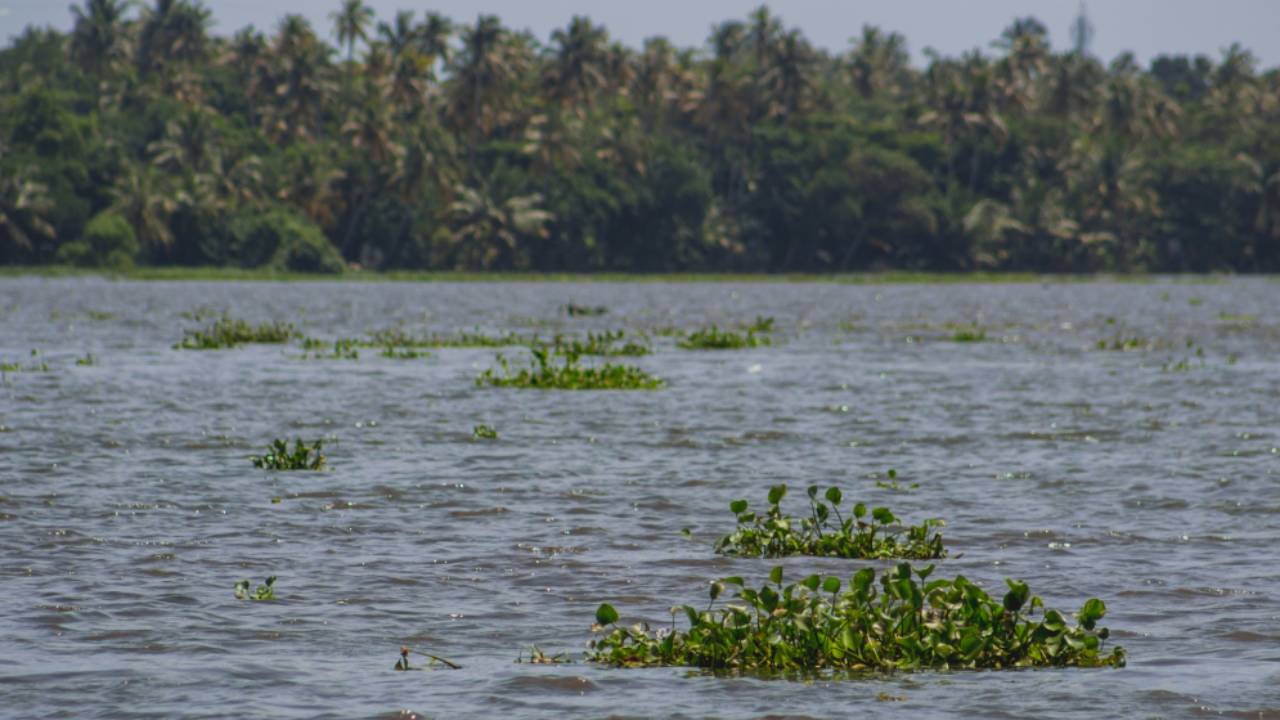
Imagine a once-dry lake in Karnataka’s Bidar city, now buzzing with life, supporting local fishermen, and pulling in visitors from nearby cities. That’s the story of Janawada Lake—a stunning transformation that’s breathing new energy into the community and turning heads as a must-visit picnic spot.
How Janawada Lake Rejuvenation Turned Into a Sustainable Source of Income for Local Fishermen
Thanks to the Mission Amrit Sarovar program under the Mahatma Gandhi National Rural Employment Guarantee Act (MGNREGA), this lake got a second chance. Back in 2022, the rejuvenation project kicked off, aiming to revive 91 lakes across Bidar district. Janawada was one of them, and boy, has it paid off! After two solid monsoon seasons, the lake is brimming again, proving that a little care can go a long way.
For the local fishing families, it’s been a game-changer. Two societies, made up of 65 hardworking members, are now thriving here, raising four popular fish species—goldfish, catla, mrigal, and rohu. In just two years, they’ve harvested around 10 quintals of fish, sending their catch to big markets like Bengaluru, Hyderabad, and Pune. It’s not just about the fish; it’s about steady income and hope for folks who’ve long depended on this land.
But it’s not all work and no play. Janawada Lake’s peaceful vibes and lush surroundings have caught the eye of tourists too. “It’s the natural beauty and easy access that make it a perfect getaway,” says Girish Badole, the Chief Executive Officer of Bidar Zilla Panchayat. Whether you’re from a neighboring village or just passing through, the lake’s charm is hard to resist.
Janamma, the Deputy Director of the Fisheries Department in Bidar, calls it an ambitious success. “We took on this project to bring ponds and lakes back to life, and Janawada is proof it’s working,” she says. The Sagar Society, which leases the lake for fish farming, has turned it into a sustainable hub—balancing livelihoods with nature.
So, next time you’re looking for a serene escape or a peek into a community reborn, Janawada Lake in Bidar might just be your spot. It’s more than a lake—it’s a story of revival, resilience, and a little slice of paradise in Karnataka.
Karnataka
Shocking Revelation: 72% of Bottled Water in Karnataka Deemed Unsafe or Substandard
Imagine reaching for a refreshing bottle of water, trusting it’s safe to drink, only to find out it might be hiding harmful contaminants. That’s the unsettling reality uncovered in Karnataka, where a recent investigation by the state’s Food Safety and Drug Administration has exposed serious concerns about the quality of bottled water. In a special […]
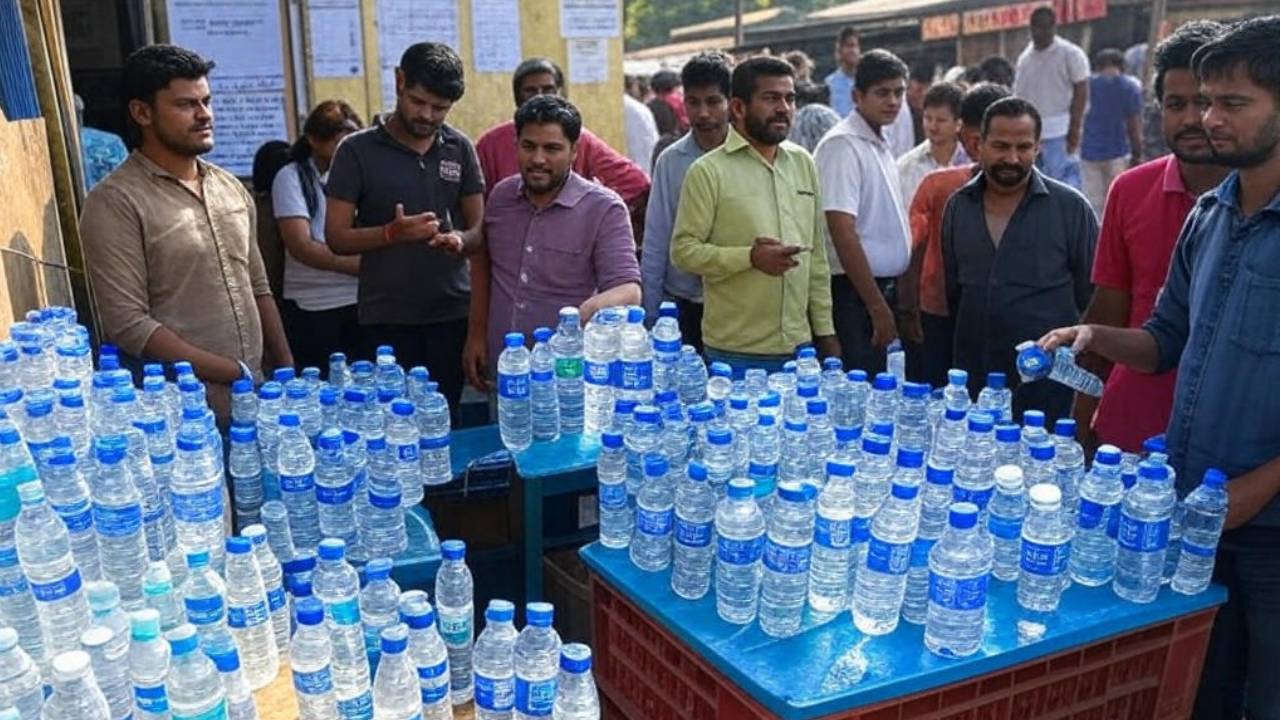
Imagine reaching for a refreshing bottle of water, trusting it’s safe to drink, only to find out it might be hiding harmful contaminants. That’s the unsettling reality uncovered in Karnataka, where a recent investigation by the state’s Food Safety and Drug Administration has exposed serious concerns about the quality of bottled water. In a special campaign launched in February 2025, officials collected 296 samples from across the region. Of the 255 samples analyzed so far, a staggering 72%—or 183 bottles—were flagged as either unsafe or of poor quality. This alarming statistic has left residents questioning the safety of a basic necessity they rely on every day.
The Numbers Tell a Worrying Story
Out of the tested samples, only 72 were deemed safe for consumption. Meanwhile, 95 bottles failed safety standards due to dangerous chemical or microbial contamination, posing real health risks. An additional 88 samples didn’t quite meet the mark either, classified as substandard because of low mineral content or other quality issues. With analysis still underway for the remaining samples, the full scope of the problem could grow even larger. Karnataka’s Health and Family Welfare Minister, Dinesh Gundu Rao, didn’t mince words when he shared the findings with the press, calling the situation “deeply concerning” and “unacceptable.”
What’s Lurking in Your Water?
So, what exactly is tainting these bottles? According to the minister, the unsafe samples contained a mix of chemical pollutants like pesticide residues, fluoride, and excessive levels of total dissolved solids (think calcium and magnesium). On top of that, microbial contamination—such as bacteria—was detected, adding another layer of risk. Even the substandard samples, while not immediately hazardous, fell short of expectations due to insufficient minerals, which could still affect long-term health. It’s a wake-up call that not all bottled water is as pure as the labels might suggest.
Cracking Down on Culprits
The state isn’t sitting idle. The Food Safety and Drug Administration is gearing up to take action, starting with collecting legal samples from bottled water companies. Once the evidence is in hand, they plan to file cases against manufacturers found guilty of supplying subpar or dangerous products. “We’ve only taken survey samples so far,” Minister Rao explained. “But now, we’re moving to legal samples to hold these companies accountable.” This step signals a broader push to clean up the industry and protect public health.
Beyond Water: A Wider Food Safety Mission
This bottled water scandal is just one piece of a larger effort by Karnataka’s health officials. In March alone, they analyzed over 3,200 food samples, including paneer and ghee, to root out unsafe products. For instance, out of 32 tested paneer samples, two were unsafe, while six out of 49 ghee samples met safety standards so far. The state’s mission? To ensure that everything from your drinking water to your daily snacks meets the highest quality benchmarks.
What This Means for You
For Karnataka residents—and anyone who trusts bottled water—this news is a stark reminder to stay vigilant. While the affected brands haven’t been publicly named yet, the minister hinted that some well-known names might be involved. Until more details emerge, it’s worth double-checking the source of your water and keeping an eye out for updates from the authorities. After all, when it comes to something as essential as water, you deserve to know it’s safe to sip.
A Call for Change
Minister Rao emphasized that this isn’t just about punishment—it’s about prevention. “Our goal is to raise awareness and improve food production quality,” he said. By cracking down on violators and educating the public, Karnataka’s health department hopes to turn the tide on this troubling trend. For now, though, the message is clear: that bottle of water in your hand might not be as trustworthy as you think. Stay informed, stay cautious, and let’s hope for cleaner, safer options on the shelves soon.
-

 india2 years ago
india2 years ago“Major Crash of Sukhoi Su-30 and Mirage 2000 Fighter Jets in Madhya Pradesh”
-

 Sports2 years ago
Sports2 years agoWFI meetings on April 16, elections likely to be discussed
-

 india1 year ago
india1 year agoPM Modi Meets Deve Gowda for Seat Sharing Talks
-

 india1 year ago
india1 year agoBengaluru: False threat to bomb Raj Bhavan
-

 india2 years ago
india2 years ago“AIMIM to Contest 50 Seats in Upcoming Telangana Assembly Elections”
-

 Entertainment1 year ago
Entertainment1 year agoAnant Ambani: Controversy at the Ambani Pre-Wedding Bash
-

 Entertainment2 years ago
Entertainment2 years agoRajinikanth is Moideen Bhai in ‘Lal Salaam’
-
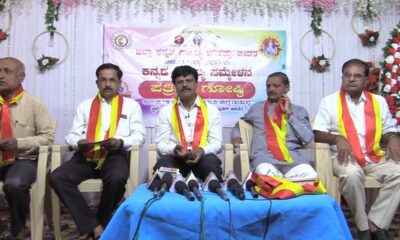
 Videos2 years ago
Videos2 years agoBidar News : Press Meet Organized By Zilla Kannada Sahitya Parishad



